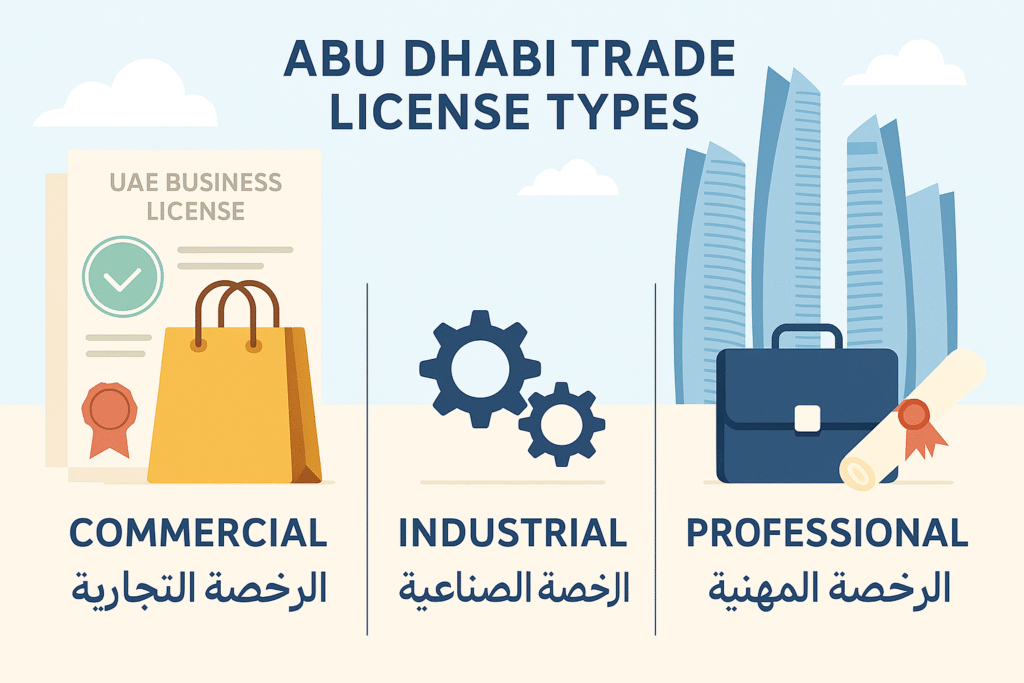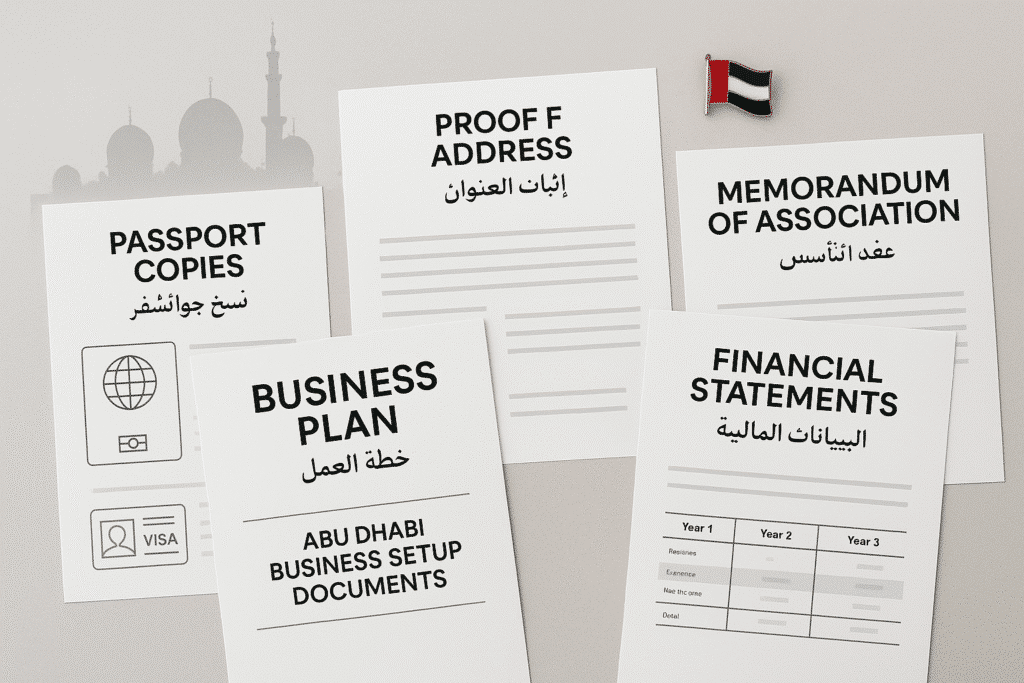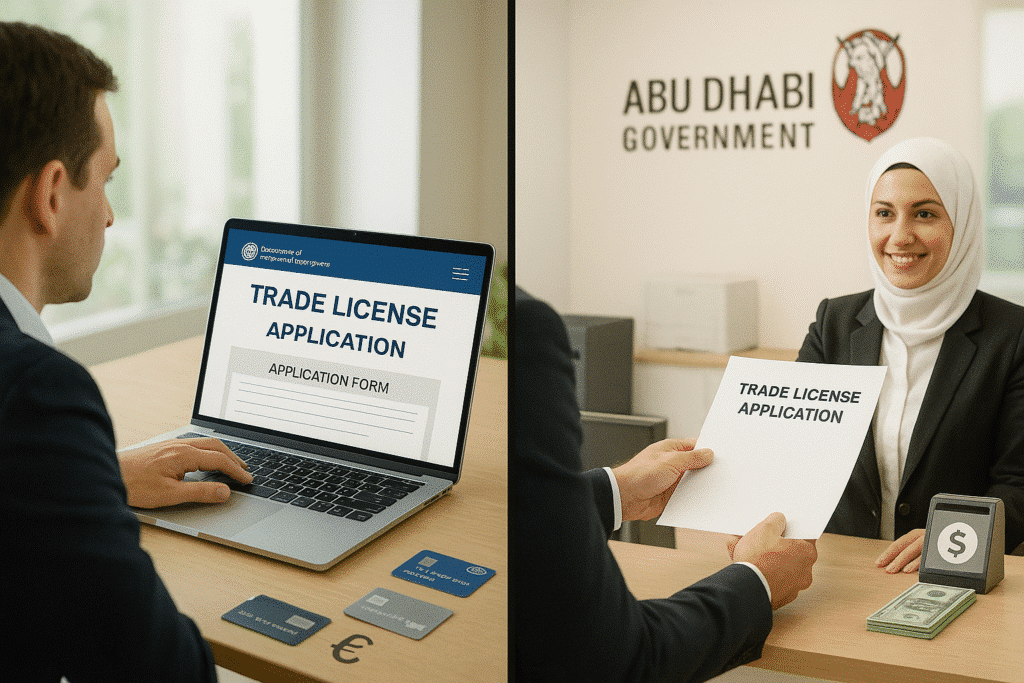
Abu Dhabi offers a potential entrepreneur a rich experience, yet it takes time to plan and follow regulations. Sequencing a trade license in this process is one of the most important steps when it comes to this process. The acquisition of an appropriate trade license is a must-do, despite being a local entrepreneur or a foreign investor, to enable the business to operate legally within the emirate.
In this guide, I shall take you through all you need to know about how to get a Trade License in Abu Dhabi, including what a trade license is all about and the application process.
What is a Trade License?
A trade license is a legal document that authorA trade license is a contract document that gives a legal consent to a business to operate in. Abu Dhabi. In this document, the kind of business activities that the company is supposed to do is stipulated. Failure to have a trade license in place would mean your business activities will be regarded as illegal in Abu Dhabi and attract serious penalties and legal-related issues.
Step-by-Step Guide to Obtaining a Trade License in Abu Dhabi
1. Determine Your Business Activity

Determination of the nature of your business forms the first step in acquiring a trade license in Abu Dhabi.
Identifying Your Business Activity
You need a clear-cut definition of what your business will be doing. Are you going to sell products, services, or do manufacturing? The activity selected will define the kind of trade license you will require as well as the legal regulations that operate in your business.
Choosing the Right Activity Classification
Department of Economic Development of Abu Dhabi (DED)contains extensive business operations. Based on this list, you must be able to select what suits your business to fit in the approved categories. This is an important step because it affects the nature of the license, fees, and legal requirements.
2. Select a Business Name

The name of your business is not merely a procedural thing or a formality; it is the identity of your branding. Nevertheless, there are some rules for naming a child in Abu Dhabi.
Naming Guidelines
The company name should be different, acceptable to its culture, and in accordance with the naming convention of Abu Dhabi. Do not have names that are similar to other trademarks.
Approval Process
After selecting any name, there is a need to take it to the DED to be approved. It remains a key process since it will help clear your proposed name so that it does not infringe on any trademarks, and they are in compliance with the regulatory standard.
Read Also: Dubai Family Paradise: 15 Best Hotels for Unforgettable Adventures
3. Choose the Appropriate License Type

The nature of your activity determines what kind of license to trade you may require
Types of Trade Licenses
- Commercial License: Applicable to business ventures in trading activities on retail, wholesome, and distribution.
- Industrial License: This is the best license to use by a business involving manufacturing and other industrial processes.
- Professional License: The service-oriented businesses need to have this to clear off, particularly those businesses that are run by persons with given skills or qualifications.
There are rules, fees, and requirements that are aimed at each license type. This is important in your business to operate well in and survive legally.
4. Find a Local Sponsor (If Required)

The foreign investors frequently have to collaborate with the UAE national who will become the local sponsor.Local Sponsor Requirement
A local sponsor is a national of the UAE holding a share in the business (normally 51 percent). Mainly, this requirement is for businesses on the mainland. In particular situations, however, this can be waived off, e.g., to set up a business in a free zone.
Selecting a Trustworthy Sponsor
A local sponsor is a national of the UAE holding a share in the business (normally 51 percent). Mainly, this requirement is for businesses on the mainland. In particular situations, however, this can be waived off, e.g., to set up a business in a free zone.
5. Prepare the Required Documents

The application process requires the appropriate documentation, which is important.
Key Documents Needed
- Passport Copies: These would be needed by all owners of the business and all the partners.
- Visa Copies: To be used by foreign investors and partners.
- Proof of Address: This is normally needed for the physical location of the business
- Business Plan: It gives details of your business goals, plans, and financial forecast.
- Memorandum of Association (MOA): Spells out the understanding of the business associates.
- Financial Statements: Decisions sometimes demand them, particularly when one is looking into expanding an already established business.
Having all the documents complete and up to date will leave you with sufficient time on your hands, not to mention undue delays in your application.
6. Submit Your Application

It is after having your documents ready that one can go ahead with the application.
Online vs. In-Person Submission
It is possible to apply for a trade license through the web on the site of the DED or by coming in person to one of the service centers. Cases may require in-person applications, and the online process can usually be faster and more convenient, though.
Application Fees
You will have to pay fees when you make your application. The level differs by the kind of license and the activity of the business. Always note that first approvals and reservations of names are liable to extra charges.
7. Obtain Initial Approvals
Once you have made an application, the DED will take a look.
The Review Process
The DED will review your application so that all information is accurate and in line with local regulations. They can ask to provide other documents, some approvals by other departments of the government depending on what you do.
Handling Additional Approvals
Certain ventures must get additional licenses from the government authorities. As an example, a restaurant business would require the approval of the Food Control Authority, whereas a medical clinic would require the clearance of the Health Authority of Abu Dhabi (HAAD).
8. Get Your Establishment Card
After you have made the preliminary approvals, you will be issued an establishment card.
What is an Establishment Card?
An establishment card is a necessary document confirming the official place of business operation and operations. There is a need to get employees, sponsoring visas, and other administrative work..
How to Use the Establishment Card
This is the card that will open many doors to doing business in Zambia, such as opening a corporate bank account, sponsoring employees, and applying into government tenders..
9. Obtain the Final Trade License
The last step in the process is obtaining your final trade license.
Completing the Final Procedures
After all the approvals have been done and the documentation has been completed, DED will stamp your trade license. This is a document issued to you that legally allows you to commence your business in Abu Dhabi.
Validity and Renewal
Your trade license is generally awarded on a yearly basis and requires renewal each year. Not renewing it on time may lead to some fines or even to the loss of the business license
Costs and Fees Associated with a Trade License in Abu Dhabi
The cost of obtaining a trade license in Abu Dhabi varies based on several factors. Understanding these costs can help you budget effectively for your business launch.
Factors Influencing Trade License Costs
Type of License
The cost will greatly depend on the nature of the license you select (commercial, industrial, or professional). As a rule, industrial licenses are costlier compared to the commercial or professional licenses.
Business Activity
Some business operations attract extra permits or an increase in fees. As an example, firms that deal with hazardous materials or high-risk procedures might see heavier costs.
Location
The place of business is a factor as well. The companies in free zones may receive lower fee charges and tax exemptions, and those in the mainland may incur more costs.
General Fee Estimates
Just to paint you a better picture, here is an overall breakdown of the money involved in the various types of licenses one should have in order to trade:
Commercial License
- Estimated Fees: AED 5,000- AED 20,000
- Ideal For: This is perfect for Retail, wholesale and distribution enterprises
Industrial License
Professional License
- Estimated Fees: AED 10,000 -AED 50,000 or Above
- Ideal For: Manufacturing, production, and Industrial activities
- Estimated Fees: Depends a lot on the occupation
- Ideal For: Independent professionals like consultants, doctors, and artists
Additional Costs to Consider
In addition to the general licensing costs, you must include expenses of approvals, visas, office space, and professional services. There can also be extra costs to partnering with a local sponsor, in that case as well.
Read Also: What Is A Good Salary In Dubai?
Conclusion
The procedure of obtaining a trade license in Abu Dhabi is an organized one that requires both planning and attention to detail. As demonstrated in the steps highlighted in this guide, it is possible to go through the application procedure with the kind of confidence and thus be certain that your business is well within the acceptable regulations in the locality. As an entrepreneur (local or foreigner), one of your priorities should be the acquisition of the appropriate trade license to make your venture thrive in the city of Abu Dhabi.
Whether it is the type of business activity you will engage in or the kind of license to acquire, all these decisions will affect the orientation of your company. Armed with the right strategy and good planning, you will be able to set up a good base in the business and utilize all that Abu Dhabi has to offer.

